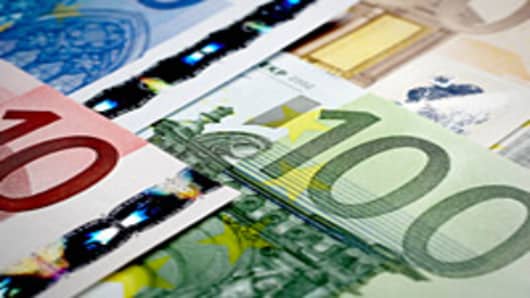The euro may be weakening, but it maintains a strong grip on the world's stock and commodities markets.
For that reason, investors are keeping an eye on a full meeting of European finance ministers in Brussels Tuesday. Ministers from the 16 countries that use the euro currency met Monday for the first time since announcing their trillion dollar stabilization program.
At the end of the meeting, finance ministers told reporters that the debt crisis would not result in such a restrictive fiscal stance as to cut off growth for the euro area as a whole. They also said Greece was receiving its first funds.
The euro , meanwhile, was under pressure most of Monday but turned positive late in the New York session, taking the stock market on a wild ride with it. The euro was up 0.02 percent against the dollar, its first gain in five sessions. It finished at $1.2384, after falling below $1.23.
The Dow finished up 5 at 10,625, but was down as much as 184 points at midday. The S&P 500 finished up 1 at 1136, after dipping more than 20 points. The Nasdaq was up 7, at 2354, as tech buying helped kick start the reversal.
"The euro is the new correlation trade. Stocks are now tipping off of the euro. Before, equities used to drive risk appetite and the euro/dollar. Now because of the developments in the euro zone, it's the move in the euro/dollar that affects all the risk assets across the board," said Boris Schlossberg, director of currency research at GFT Forex. "I think we're clearly coming to some sort of short-term sentiment bottom."
"We may be leveling out here, and we may be having a little bit of a short covering rally, taking it back to $1.25," he said.
Schlossberg said he thinks euro zone nations are nowhere near a formal intervention at this point, though they are "verbally" intervening so their meeting will be watched closely. He pointed to comments by Luxembourg Prime Minister Jean-Claude Juncker, who chaired Monday's meeting. Juncker said he didn't have a problem with the level of the euro but he was concerned by its rate of decline.
"We'll see if there's any new developments from the euro finance ministers. It's basically a regular monthly meeting, but now it's being looked at as a big media event," he said.
As for stocks, T3Live.com's Scott Redler says the market may have seen the lows of the week. Redler, who follows the market's short-term moves on a technical basis, said the market is now oversold.
"If the euro bounces a bit, it could provide the thesis for the S and P to come to the 1145 to 1150 range by options expiration, which is Friday," he said. "1116 (Monday's low) is the new low traders will look at. It will be the new point of reference and could be the low of the week."
"The real important thing is what happens in the next few weeks after that. A wedge will be formed and we'll be looking for some type of macro resolution," he said.
What Else to Watch
Home Depot and Wal-mart earnings will figure large ahead of the opening bell Tuesday, particularly after Home Depot rival Lowe's issued a disappointing profit forecast for the rest of the year. Lowe's comments Monday that it was still cautious about the consumer and the economy in general was an early a drag on stocks.
Tuesday's economic reports include producer price inflation data and housing starts, both released at 8:30 a.m.
As BP struggles to contain the oil spewing into the Gulf of Mexico, BP America Chairman Lamar McKay; Transocean CEO Steven Newman and Coast Guard Commandant Thad Allen are scheduled to appear before the Senate Commerce, Science and Transportation Committee. Administrations officials, including EPA Administrator Lisa Jackson are expected to testify before the Senate Environment and Public Works Committee.
Financial stocks, which finished flat Monday after a steep dive, will continue to stay in the headlines as the Senate continues work on regulatory reform legislation. Both J.P. Morgan and Morgan Stanley hold annual meetings, where shareholders are likely to ask them both about reform and federal and New York state probes into the industry.
Mining company Massey holds its annual meeting in Richmond, Va. and will no doubt be grilled about mine safety and the mine explosion that killed 29 workers.
More From CNBC.com:
Making a Flight to Safety
Flight to Safety
Treasurys have been the safe haven play since the European sovereign debt crisis started rattling markets. On Monday, they came under selling pressure as risk assets reversed losses. The yield on the 10-year rose to 3.470, and the 2-year yield rose to 0.806 percent.
Morgan Stanley, which had the most aggressive forecast for interest rates on the street, changed its call for a 5.5 percent yield on the 10-year by year end. The firm, in a Friday call, now expects a 4.5 percent yield.
"When the world changes, you change your mind," said Morgan Stanley economist Richard Berner.
Berner had based his original forecast on the assumption that the large issuance of U.S. government debt, at the same time a recovering economy spurred private credit demand, would pressure rates.
"We changed our mind because of the credit crisis...and its potential spillover into the U.S.," he said. "...I worry about the contagion spreading through the financial system. That is the prime worry."
Berner said he and Morgan Stanley economist David Greenlaw also based their new call on new expectations for the Fed. "We earlier thought the Fed would be tightening monetary policy in September. We now think that it will be another six months," he said.
But the economists also upped their growth forecast at the same time. They now expect U.S. GDP at 3.5 percent in 2010, from a previous 3.2 percent.
Oil Drill
Oil sunk yet again, cracking the $70 per barrel mark, but ending at $70.08, down 2.1 percent.
Birinyi Associates said oil on a 50-day basis is more oversold than it has been any other time in the past year. It finished the day more than 13 percent below its 50-day moving average. Birinyi said on 63 dates where oil was as oversold, the commodity would be up 66 percent of the time over the next six months. But oil-based equities were up 84 percent of the time, making buying the stocks the best way to play the dip.
Gold, meanwhile, gained $0.30 per troy ounce to $1,227.70 .
"Gold is trading fully inverse to the market and oil is trading as an economic world barometer," said Redler. "Every time it seems there's problems in Europe or China, oil comes in and gold goes up, while six months ago they were trading together."
Signs the gold rush has moved from Wall Street to Main Street came in an announcement from Sears and Kmart Monday. They announced plans to help customers turn their gold and silver into cash, through a relationship with Pro Gold Network. Customers would be able to visit a jewelry counter and have their items sent by the retailers to Pro Gold, which makes an offer customers can either accept or reject.
More From CNBC.com:
Questions? Comments? Email us at marketinsider@cnbc.com.




